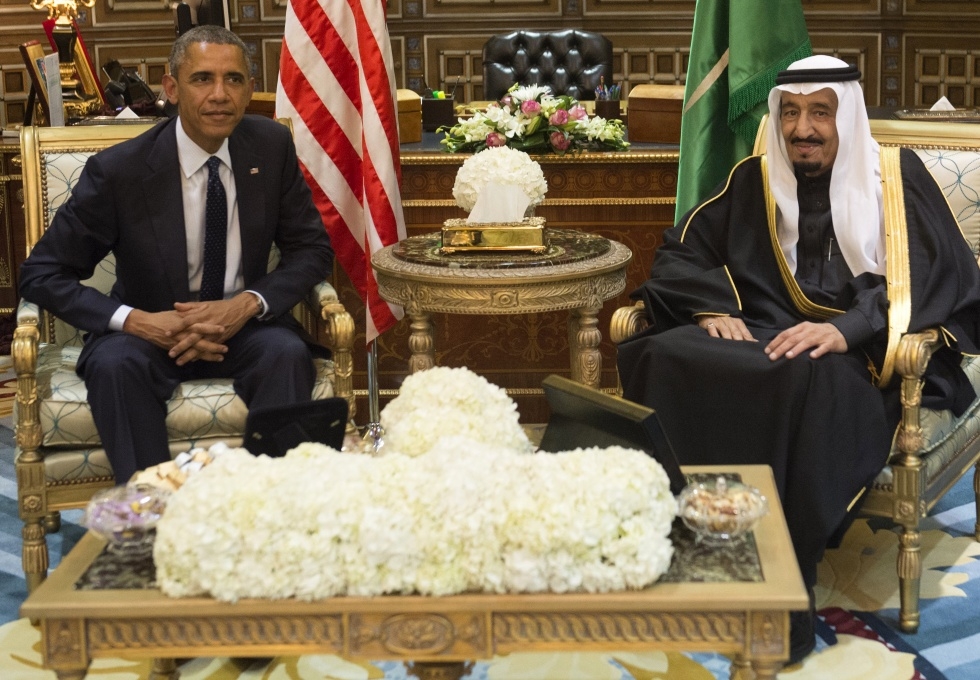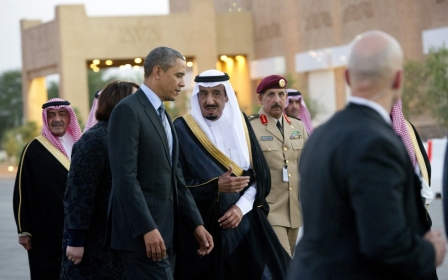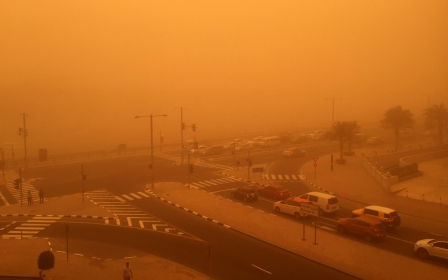ANALYSIS: King Salman’s snub of Obama matches Netanyahu’s ear-bashing

NEW YORK, United States – Barack Obama’s summit for rulers of Gulf petro-monarchies at the US president’s retreat was meant to prop up a decades-old alliance amid fears that a nuclear deal with Iran will strengthen Tehran’s hand in the region.
Instead, a two-day meet with envoys from the six-nation Gulf Cooperation Council (GCC) at Camp David and the White House, spotlights stark divisions. Absent of any looming deal to boost US military aid to its oil-rich Sunni allies, key players are not showing up.
Saudi Arabia’s King Salman is one of four Gulf monarchs to skip the photo opportunity with Obama. While quieter than Israeli Prime Minister Benjamin Netanyahu’s bashing of his Iran deal in March, the Saudi snub is widely seen as equally serious.
“King Salman’s decision not to come to Washington is a very deliberate signal of his lack of confidence in US policy in the Middle East. The Saudis are unhappy about Iran, Syria, Iraq and Yemen,” Bruce Riedel, a former CIA and US National Security Council official, told Middle East Eye on Tuesday.
“Unlike Israel, they don’t want a public argument with the Obama administration; they want a very public display of their dissatisfaction. There will be no Netanyahu-like scolding of the president. They send their messages by not coming to the table, not by unseemly food fights.”
Bahrain’s decision to not send King Hamad bin Isa al-Khalifa to Washington was influenced by Riyadh, Riedel added. The absence of rulers from the United Arab Emirates and Oman is likely down to their ill health rather than a diplomatic brushoff.
Israel and GCC states worry that a framework deal between the US, other world powers and Iran does not sufficiently choke Tehran’s uranium-enrichment work and that lifting sanctions gives it more money to cause mischief.
Obama believes the deal’s atomic inspection regime makes the region safer. Critics say it affords Iran a veneer of respectability while it increases cash and arms supplies to Hezbollah and other Shia Muslim forces in Iraq, Syria and Yemen.
Ahead of the meet, the UAE envoy to the US, Youssef Al Otaiba, called for a US-Gulf “security guarantee” to counterbalance Iranian aggression. This could equate to anything from more arms sales to a regional missile shield or a NATO-style defence treaty.
However, according to analysts, the US wants to extricate itself from Middle East entanglements and pivot to Asia while the GCC manages its own security. It is also conscious of Israel’s desire for military superiority over its Arab neighbours.
Speaking about the summit on Monday, White House security spokesman Ben Rhodes made no mention of a pact. Instead he expected “some form of a statement emerging from the summit that reflects the common positions of the US and the GCC”.
Derek Chollet, a US National Security Advisor until last year, said he did not expect “any sort of NATO Article 5-like arrangement” with the Gulf states, referring to that treaty’s pledge that an attack on one member is considered an attack on all.
According to US National Security Advisor Colin Kahl, the US already has 35,000 troops in the Gulf, a Bahrain-based naval armada, missile batteries and radar systems. Instead of more arms sales, he reiterated Washington’s long-standing call for inter-GCC cooperation.
“The ability of any country in the region to defend against a missile threat pales in comparison to the ability of the GCC as a whole, as a collective, to defend against this threat if their systems were better integrated,” he told reporters on Monday.
According to Jon Alterman, a former US State Department analyst, the US supports Saudi airstrikes on Yemen’s Iran-backed Houthi rebels and would deter an Iranian assault on the Arabian Peninsula. But Gulf leaders are more worried about Iranian proxies in Beirut, Damascus, Baghdad and Sanaa, he said.
“The US does not see eye-to-eye with its Gulf allies on exactly what kind of Iranian aggression should spark a US reaction, because the Iranians tend to act asymmetrically and the US is best at responding to conventional military forces,” he told MEE.
These differences of opinion mark a low point in a strategic alliance that has survived decades of turmoil in the Middle East, Alterman said.
“GCC states want most reassurance where the US is least able and most unwilling to provide it. They see a pattern of Persian expansionism that dates back millennia; the US won’t commit to an open-ended ethnic or sectarian fight,” he added.
“While we may see some positive developments at this summit, everybody will leave feeling a little dissatisfied.”
For others, the foundations of the US-GCC alliance were already shaky. While the US espouses liberties and democracy, Gulf states are routinely berated for low levels of free speech and their harassment of political opponents and treatment of migrant labourers.
In Saudi Arabia, the blogger Raif Badawi is serving a 10-year jail term and received the first 50 of his 1,000 lashes after Friday prayers in a public square in Jeddah in January. His crime: setting up an online debate forum. The pressure group Amnesty International calls him a “prisoner of conscience”.
“President Obama has said that the big problem for our Gulf allies is not Iran – it’s the citizenries of those countries that do not feel included in society and lack opportunities,” Tarek Masoud, co-author of The Arab Spring: Pathways of Repression and Reform, told MEE.
“Perhaps this is a message he would like to deliver at Camp David.”
New MEE newsletter: Jerusalem Dispatch
Sign up to get the latest insights and analysis on Israel-Palestine, alongside Turkey Unpacked and other MEE newsletters
Middle East Eye delivers independent and unrivalled coverage and analysis of the Middle East, North Africa and beyond. To learn more about republishing this content and the associated fees, please fill out this form. More about MEE can be found here.




